Efficient project management — everything from breaking down projects into smaller tasks, planning, and scheduling to keeping track of progress — sets the foundation for business success.
With that in mind, you’ll be glad to hear that there’s no shortage of tools that will help your team manage projects, collaborate remotely, and stay organized.
However, even the most popular productivity apps have vastly different approaches to project management, making it hard to choose the right one for your business.
This article will compare Trello vs Notion — two popular project management software — in terms of key features, integrations with third-party apps, pricing, and user experience to help you make an informed decision.
Trello
Trello is an Agile project management tool based on Kanban boards. It was initially developed under Fog Creek Software in 2011 but has been a part of the Atlassian ecosystem since 2017.
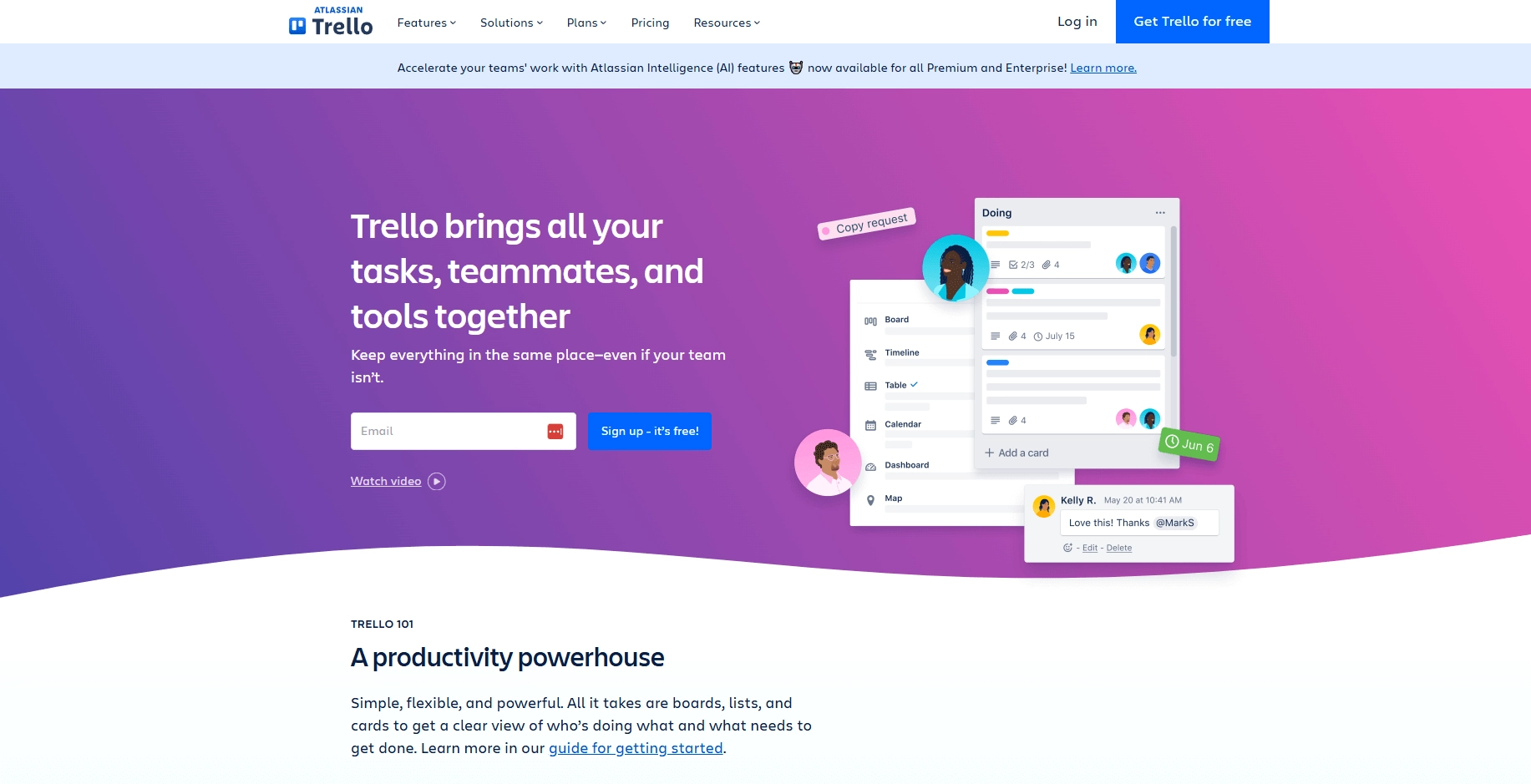
This platform’s main selling points are simplicity and a visual approach to project management. It boasts an intuitive interface with drag-and-drop functionality that allows you to organize individual tasks into task boards.
Granted, Trello is not a highly adaptable project management solution like Notion, and it doesn’t have the AI-driven automation capabilities of tools like Motion. Plus, scalability could be a potential issue for large companies.
However, Trello can still be an excellent choice for Agile workflows and remote teams that manage simple projects — especially if they’re looking for straightforward task tracking with a visual representation of tasks.
Trello’s key features
Here’s an overview of some of Trello’s most powerful features and capabilities, from basic collaborative features to automation functionality:
- Support for unlimited boards and cards for organizing your tasks
- Custom fields for structuring information on Trello cards
- Collaboration features, including advanced Workspace views and commenting on cards with @mentions and file attachments
- Board Collections (these are only available for Premium and Enterprise users)
- Advanced checklists that allow you to add more context to checklist items by setting due dates and assigning members to each task
- Additional views of your projects besides basic Kanban boards, including dashboard, timeline, calendar, table, and map view
- A visual overview of workload and project progress with a built-in dashboard and custom charts
- Unlimited activity logs for keeping track of all actions taken on a board
- A native automation tool — Trello’s Butler — that allows you to set up automated custom workflows through no-code automation
- A collection of ready-to-use and customizable templates
Trello is also available as a desktop and mobile app on both Android and iOS mobile devices and is supported on most browsers, including Chrome, Safari, Edge, and Firefox.
As for Trello’s built-in security features — namely two-factor authentication and built-in mobile device management — they’re available on all plans. However, SAML Single Sign-On (SSO) is only available as a paid add-on with Atlassian Access and costs $4 per month per user.
Notion
Notion was originally a note-taking tool but has since grown into a comprehensive, all-in-one workspace that uses a building block approach to combine note-taking, knowledge management, and project management.
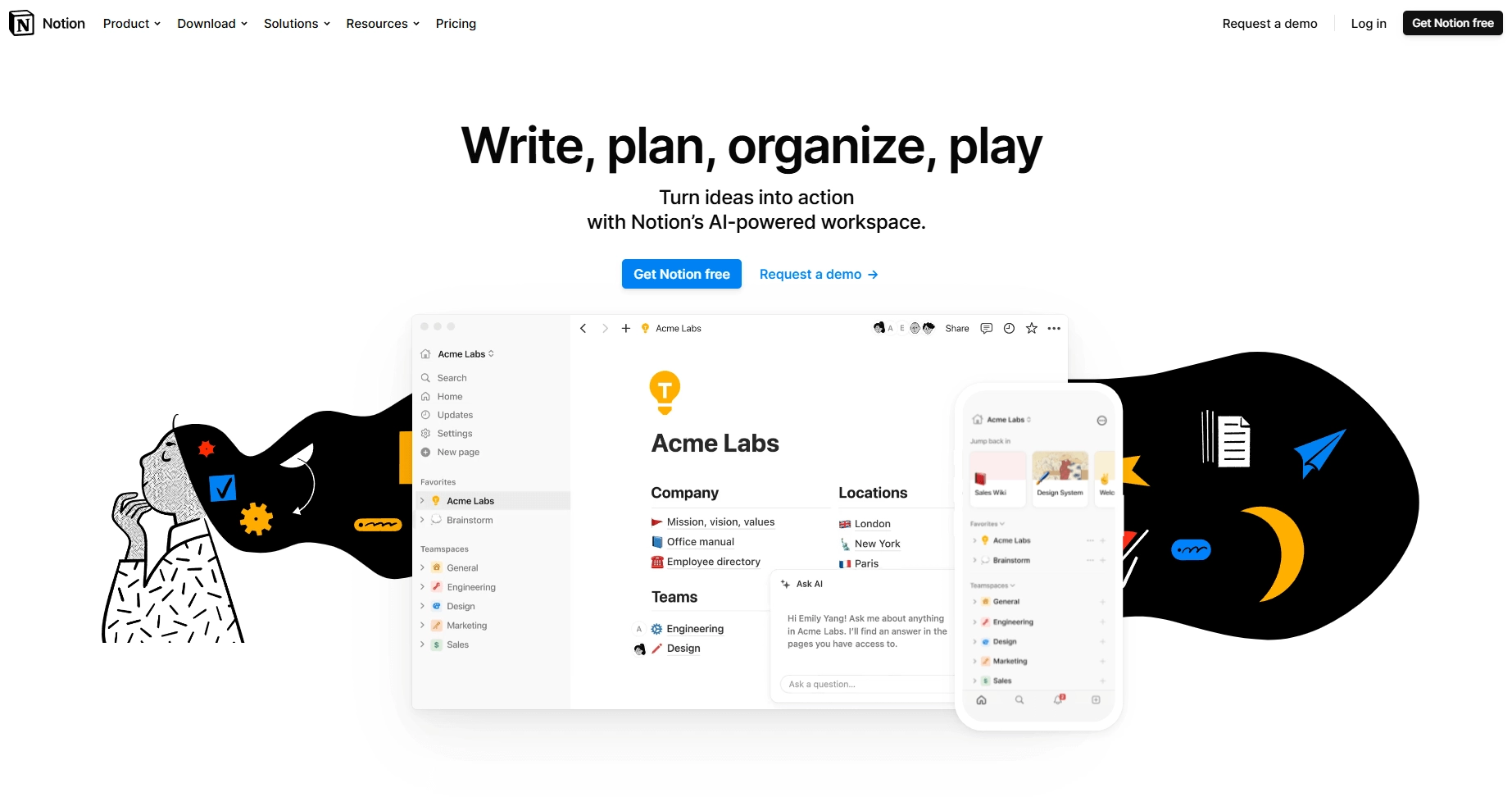
This adaptable workspace can be a great choice for individuals and teams alike, as long as you’re not intimidated by the steeper learning curve that comes with its fully customizable workspace.
Notion offers lots of customization options and a breadth of features that can help you manage tasks, write to-do lists, take meeting notes, create databases, and stay organized — but it still can’t compete with an AI-driven all-in-one productivity solution like Motion.
Notion’s key features
Here’s what Notion has to offer in terms of key features and capabilities:
- Support for many different types of content blocks, including text, images, videos, to-do lists, code blocks, databases, and embeds, which can be rearranged with drag-and-drop functionality
- Tasks and subtasks with assignees, due dates, dependencies, and custom statuses and priority levels
- Additional workspace views for task and project tracking, including boards, timelines, and calendars
- Real-time collaborative editing in docs, with comments, @mentions, and reminders for advanced team collaboration
- Page history and analytics, with the option to restore pages to the previous version
- The option to connect multiple Google Calendars in Notion Calendar
- Wikis for centralized knowledge management, with built-in search and filters
- Custom properties and filtering for databases
- Unlimited file uploads with a limit of up to 5GB per file (available with paid plans)
- The option to invite between 10 and 250 guests (depending on the plan)
- A template gallery with thousands of free and paid templates
- Built-in automation functionality, including workflow and database automation features (e.g., automatic creation of new content blocks and setting of statuses and assignees)
While it can’t compete with the extensive AI-driven capabilities you’d get with Motion, Notion’s integrated AI assistant is still worth mentioning. Notion AI can be added for $8 per month and includes additional Writer, Q&A, and Autofill tools.
Built-in security features are another consideration to make when choosing a project management platform.
The global market for multi-factor authentication was valued at $12.9 billion and is expected to reach $47.56 billion by 2031, driven by the rising number of data breaches and cybersecurity threats across enterprise-level organizations.
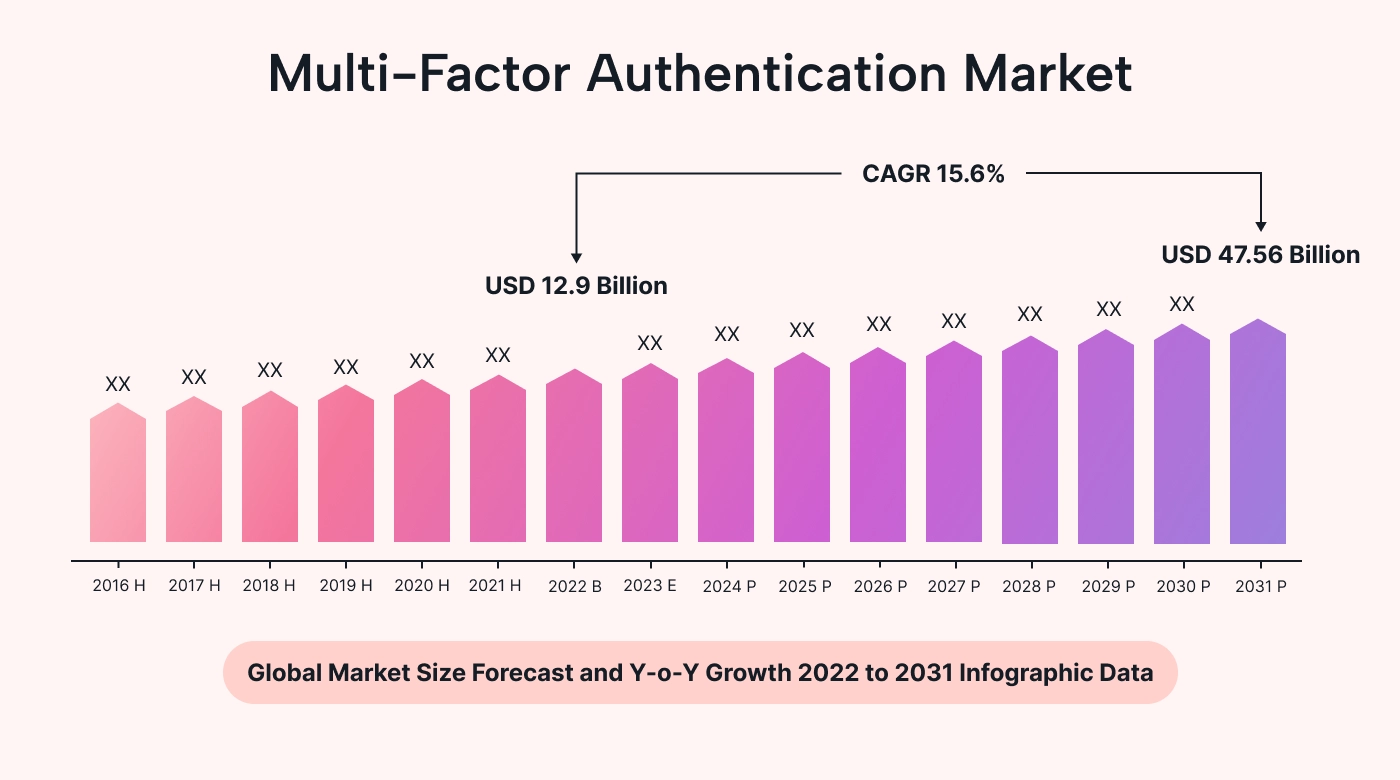
On that note, Notion offers SAML SSO and User Provisioning (SCIM). Advanced security features and controls are only available to Enterprise customers.
Notion and Trello: A quick feature-by-feature comparison
Here’s a feature-by-feature comparison of Notion and Trello to give you an idea of how these two productivity tools stack up:
- Project views: Notion and Trello both offer different types of project views, including Kanban boards, timelines, and calendars. However, most of Trello’s additional views are only available with a paid plan.
- Collaboration tools: Notion and Trello are designed for team collaboration, with features like commenting, @mentions, and file sharing. However, Notion also supports real-time document editing, which gives it a slight edge over Trello.
- Native automation tools: Both platforms support automated workflows. Trello’s Butler is built into boards, allowing you to set rules and create buttons and commands. It also provides automation tips based on your activity on a board, making it easier to use than Notion.
- AI assistants: Notion’s AI assistant, available as a paid add-on, can help with writing and brainstorming, finding information, and generating insights and summaries. While Trello also has AI capabilities — Atlassian Intelligence (AI) — those features are only available to Premium and Enterprise customers.
- Level of customization: Notion is known for extensive customization options and highly modular design, making it more flexible than Trello.
- Ease of use: This is where Trello has a slight edge over Notion. The intuitive boards are exceptionally user-friendly and allow for straightforward task tracking. Notion is a more comprehensive solution with a wide array of features, so there’s an initial learning curve to using it.
Trello vs Notion: Cost comparison
You’re likely interested in how Notion and Trello compare in terms of available pricing plans — and, most importantly, the overall value they provide for their cost.
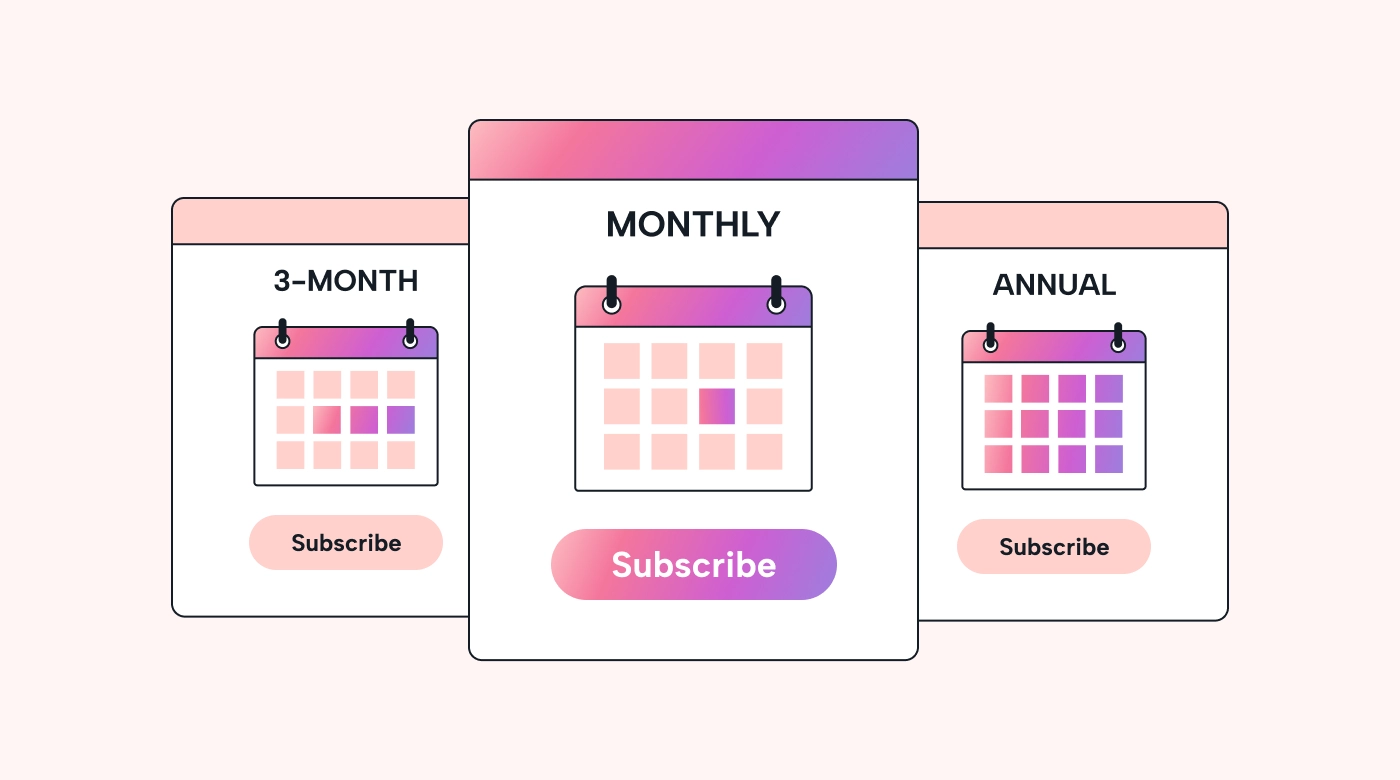
One thing these two project management platforms have in common is that they both offer users access to their basic features free of charge.
But, as you’re about to see, Trello and Notion’s free plans are only really suitable for individuals and personal use — and if you’re looking for advanced features and more control options, you’ll have to upgrade to a premium plan.
That said, Trello’s free plan users get up to 10 personal boards per Workspace, unlimited cards, up to 250 Workspace command runs per month, and unlimited Power-Ups.
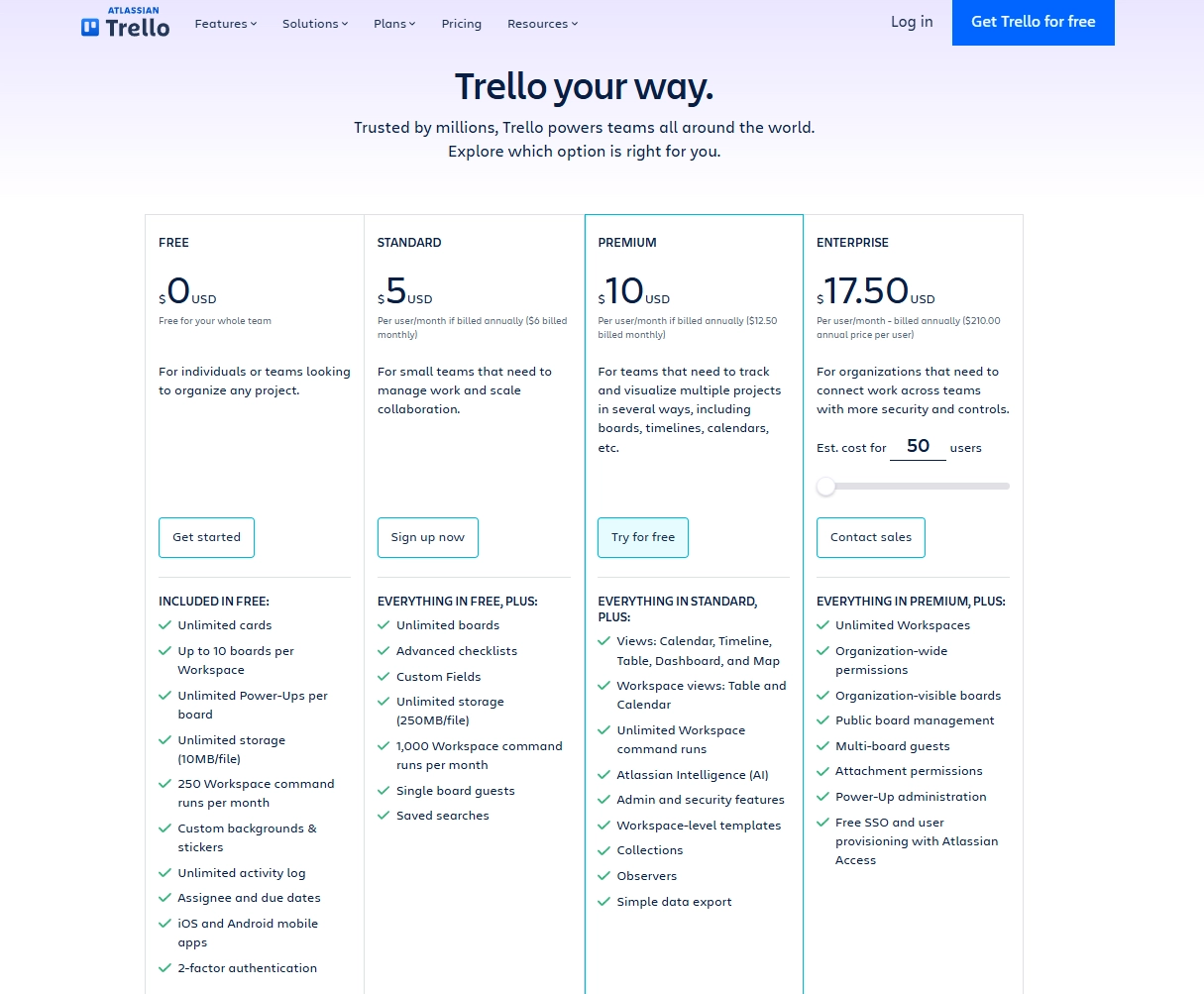
Additionally, you’ll have access to a 14-day free trial of Trello’s Premium plan.
However, as we’ve already mentioned, larger teams will likely have to go with one of Trello’s paid plans, which include the following:
- The Standard plan, which starts at $5 per user per month
- The Premium plan, which starts at $10 per user per month
- The Enterprise plan, which starts at $17.50 per user per month
Like Trello, Notion offers four pricing plans — and one of them is free.
One thing to keep in mind is that Notion’s free plan is intended for individuals, although you can invite up to 10 guests. Other than that, the free version gives you access to core features like unlimited blocks and pages, basic page analytics with a 7-day page history, and basic automation. It also includes a limited trial for two or more members.
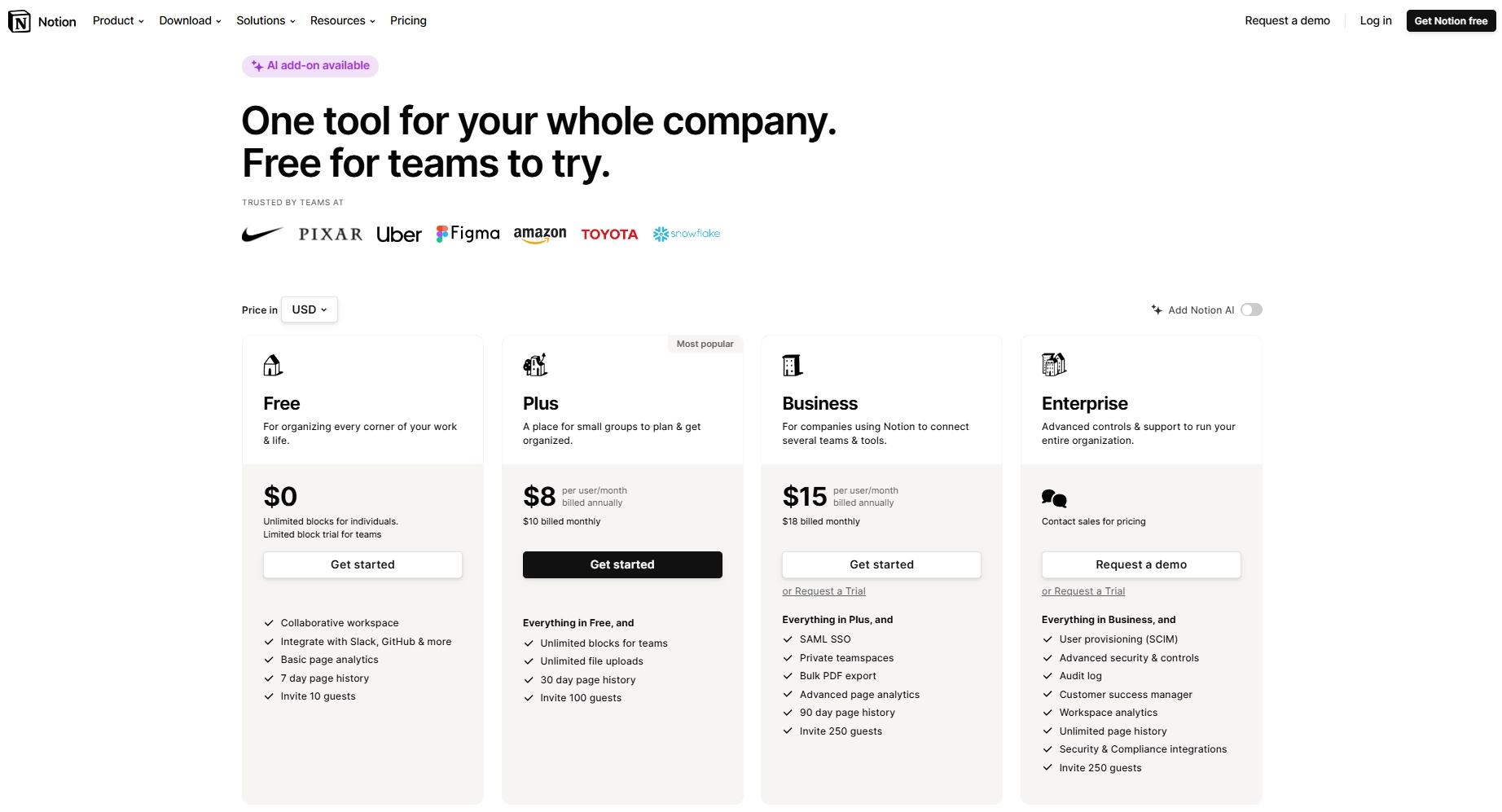
When it comes to Notion’s paid plans, your options include the following:
- The Plus plan, which starts at $8 per user per month
- The Business plan, which starts at $15 per user per month and is billed annually
- The Custom Enterprise plan for more complex organizations, with advanced permissions and control options and advanced analytics
Trello vs Notion: Integrations with third-party apps
In addition to pricing plans, consider how Notion and Trello compare in terms of advanced integrations with other file management, communication, and collaboration tools your team might already be using. That’ll give you a better idea of whether these two tools support the integrations you need for a smooth workflow.
Trello integrates with more than 200 popular tools, including Slack, Google Drive, Gmail, Evernote, Salesforce, and TimeDoctor.
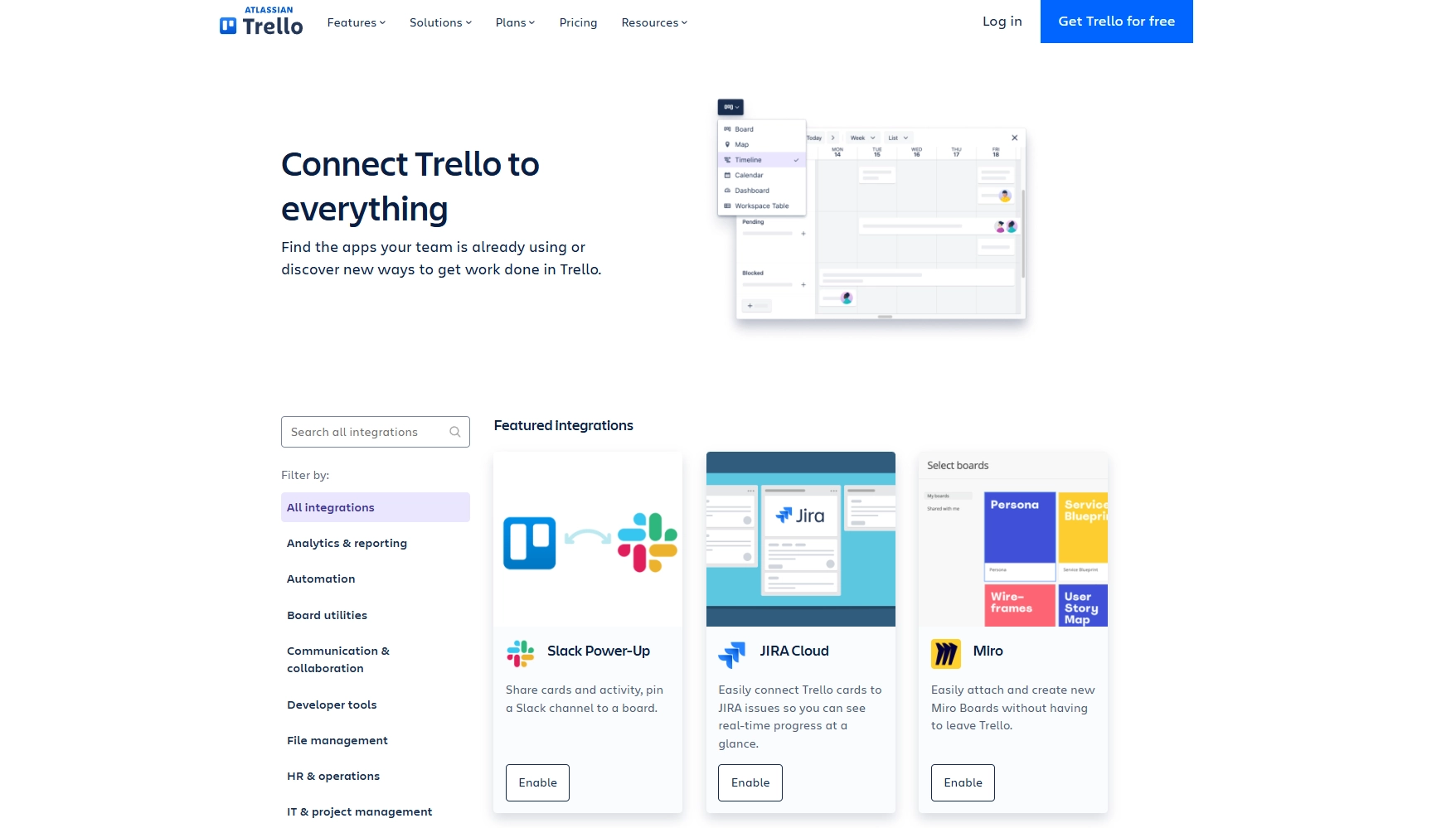
In addition to ample integration capabilities, you can extend Trello’s capabilities and range of features through Power-Ups and Zapier integrations.
Notion’s range of integrations is relatively limited compared to Trello. However, it still connects to 84 other apps and tools, including essential workplace apps such as Google Drive, OneDrive, Asana, ClickUp, Trello, and Zoom.
It’s also worth adding that Notion supports Zapier and IFTTT integrations, which adds additional automation functionalities. And, just like Motion, it has an API that allows you to set up custom integrations with third-party apps.
Trello vs Notion: Which is the better project management tool for you?
Trello and Notion clearly have quite a few similarities. After all, both are designed to serve as collaborative workspaces that help teams manage their projects and stay organized.

But if you look beyond the core features, you’ll find a few notable differences — and these should be considered when you’re trying to decide between the two.
Trello excels in terms of user-friendliness, featuring an easy-to-navigate layout and drag-and-drop functionality. As such, it can be a great choice for managing tasks and projects in Kanban-style workflows — and it won’t overwhelm new users with additional features.
That said, Trello’s not cut out for managing complex projects. If you need a more extensive feature range that can support a more complex workflow, you should look into Trello alternatives like Motion.
Notion, on the other hand, is known for its highly customizable nature and more intricate approach to project management. It also offers additional features for real-time collaboration and knowledge management.
However, Notion’s high degree of customization comes with a potential downside: a complex interface with a steep learning curve. Advanced users might appreciate the building-block approach with endless customization tools, while others may find it unnecessarily complicated or even flat-out overwhelming.
Of course, both tools are popular for a reason. So, your choice ultimately depends on what you expect from a project management platform — be it advanced features, customization options, ease of use, or cost-effectiveness — and which one is a better fit for your existing workflow and team-specific processes.
And, as we mentioned at the beginning of this article, there are currently many other project management tools available on the market. So, if you feel like neither Trello nor Notion would work for your team, consider an alternative like Motion. That way, you’ll have the best of both worlds — Trello’s ease of use and Notion’s wide range of features — in one AI-driven platform.
Motion: The best alternative to Trello and Notion
It’s crucial to consider your team’s specific use cases and needs — and, if possible, try out both options before making a decision.

That said, if you find that neither Trello nor Notion meets your business’s preferences, team dynamics, and existing workflow, then consider Motion — an AI-powered all-in-one productivity platform that can automatically prioritize tasks and manage schedules on behalf of your entire team.
Here’s an overview of Motion’s comprehensive feature set:
- Task Manager that streamlines task tracking and automatic planning based on availability, priority, and deadlines, with features like one-click task input, notes, and the option to set custom time windows for tasks and create recurring tasks
- Project Manager that automates project planning and adds tasks to your team’s custom schedules and makes project tracking easier with project templates and list, board, and calendar views
- Intelligent Calendar that combines your personal and work calendars in one place for advanced time management
- AI Meeting Assistant that automates meeting scheduling based on predefined meeting limits, preferences, and availabilities
Clearly, you can use Motion for task scheduling and project tracking — just like any other project management tool. However, it stands out thanks to its advanced automation capabilities:
Motion uses a unique algorithm to automate daily planning and task prioritization based on dozens of parameters. Plus, it can automatically schedule meetings and optimize your calendar, helping with your overall time management, organization, and productivity.
There might not be a free version, but Motion’s time-saving abilities make it a worthwhile investment.
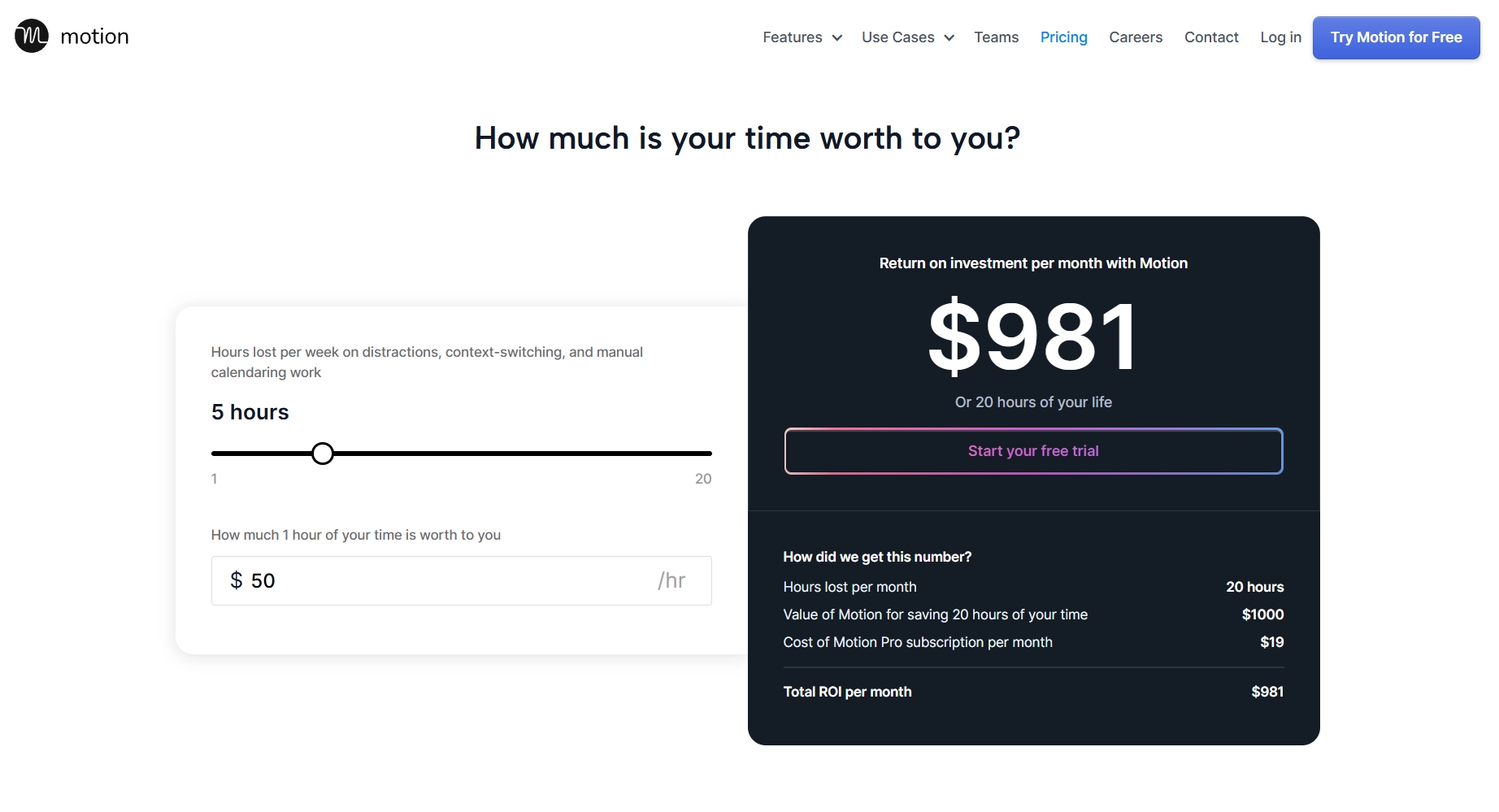
In terms of native integrations with third-party apps, Motion connects with Google Calendar, iCloud Calendar, Microsoft Outlook 365, Gmail, Zoom, and Microsoft Teams — with countless third-party integrations available through Zapier. Plus, you get to build your own custom integrations with Motion’s REST API.
Automate task prioritization and scheduling with Motion
Trello and Notion have unique strengths and weaknesses and were clearly developed to suit different types of projects and workflows. So, the choice comes down to what your team needs and expects from a project management solution.
As useful as Trello and Notion can be, there are some functionalities you simply won’t see in these apps. These include AI-powered task prioritization and automated scheduling.
If you need an app that can do more than just manage your tasks and projects, Motion — a next-generation productivity solution driven by artificial intelligence — is the alternative you’re looking for.
Ready to give Motion a try? Sign up here to start your free 7-day trial.

Dejan is a versatile, experienced content marketer who enjoys captivating storytelling, turning keywords into engagement. He's a coffee aficionado, always brewing the perfect cup for writing marathons.
![Trello vs Notion: In-Depth Comparison of Productivity Apps [2025]](/cdn-cgi/image/onerror=redirect,width=568,height=316,format=webp/https://cdn.sanity.io/images/4jvom4yf/production/834e0dd9f479fe22f562ab7e6d6b87fa16fc1e37-1400x780.webp)



